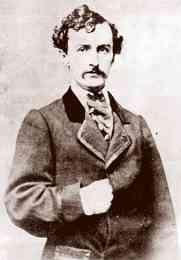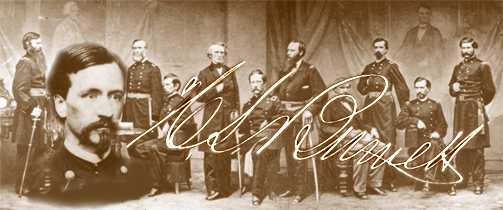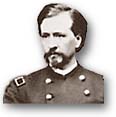It should be remembered also in this connection that during all the two months of this investigation by
the commission, each of the accused was represented by one or more
able counsel, among whom were the Hon. Beverly
Johnson, of Maryland; General Thomas Ewing, then of Washington, Frederick A. Aiken, W.E. Foster, Walter S. Cox,
and Frederick Stone, and that the whole power of the Government was put at the service of the accused,
and used unreservedly by their counsel to bring from any part of the United States any witnesses they might desire.
Some of the counsel for the accused seemed to be as much convinced as the court of the guilty participation
of the rebel authorities at Richmond and their confederates in Canada, in the conspiracy to assassinate President Lincoln. Cox said in his argument "the assassination of the President and other heads of
Government may have been discussed in the south, as a measure of ultimate resort to retrieve the fortunes
of the Confederacy, when at their lowest ebb: the rebel agents in Canada may have individually signified their
approval of the measure in the abstract, long since; but I undertake to maintain upon the evidence that there
was never any final determination, on the part of any person or persons, with whom any of these accused can possibly
be connected, actually to attempt the life of the President or other functionary until a few days -- about a week --
before the murder."
Again he says, speaking of Booth, "The theory of the prosecution is that Booth who is acknowledged to
have been the head and front and soul of the conspiracy, if there was one, was only the hireling tool of these
 rebel emissaries. I think he was probably something more, but it will not vary the result.
" I think he was probably actuated, not only by the sordid hope of gain, but by a misguided, perverted ambition.
Of strong will and passions, and high nervous organization, accustomed to play parts and those of a tragic
character, he had contracted perverted and artificial views of life and duty, and had aspired to be the Brutus
in real life that he had been or seen on the boards.
"He well knew, however, that the act that he contemplated would be execrated all the world over, except
possibly among those whom he intended to serve. Therefore, whether pecuniary reward or false glory
was his object, he could hope for neither until he was secure of their approbation. Whatever his
principle of action, he was wholly without motive for so desperate an undertaking until he supposed he had the
approval of the rebel authorities. When does the evidence show this was given?"
rebel emissaries. I think he was probably something more, but it will not vary the result.
" I think he was probably actuated, not only by the sordid hope of gain, but by a misguided, perverted ambition.
Of strong will and passions, and high nervous organization, accustomed to play parts and those of a tragic
character, he had contracted perverted and artificial views of life and duty, and had aspired to be the Brutus
in real life that he had been or seen on the boards.
"He well knew, however, that the act that he contemplated would be execrated all the world over, except
possibly among those whom he intended to serve. Therefore, whether pecuniary reward or false glory
was his object, he could hope for neither until he was secure of their approbation. Whatever his
principle of action, he was wholly without motive for so desperate an undertaking until he supposed he had the
approval of the rebel authorities. When does the evidence show this was given?"
Mr. Cox then proceeds to review the testimony, or a portion of it, given upon this point, and adds, "Thus,
in the end there is seen to be a substantial accord between all the three witnesses, on the important
question when the formal sanction of the Richmond authorities was received in Canada, and when consequently
for the first time they were in a condition to give their formal and official approval to the proposed
assassination."
Let me here say personally after this quotation from the argument of counsel for the accused themselves, that my
own judgment upon the testimony was at the time that while the proposed enterprise of assassinating
the President and Vice-President, members of the Cabinet and General Grant had been brought to the
attention of the Richmond authorities and to Jefferson Davis, there was no conclusive evidence to show
that Davis sanctioned or approved this undertaking. The proof, I think, also shows that it was brought to his attention and that he did not condemn or
undertake to suppress the movement.
That the Confederate agents in Canada did actually take
part in fomenting and forwarding the conspiracy, I think was conclusively established.
As early as November 1864, Booth was considering wild schemes either of forcible abduction of the
President or assassination and was busy, from that time down to the day of the assassination, in
trying to enlist others in the devilish enterprise.
 CONTINUE
CONTINUE

-
 A Lawyer/Soldier Called To Serve
A Lawyer/Soldier Called To Serve
 Colonel Burnett,
Colonel Burnett,  Mood of the Time,
Mood of the Time,  Deathbed
Deathbed
 What Was Known
What Was Known
 Investigation,
Investigation,  Assassination,
Assassination,  Seward's Attack,
Seward's Attack,  Other Attempts
Other Attempts
-
 The Investigation
The Investigation
 First Steps,
First Steps,  Military Court
Military Court
-
 The Conspiracy
The Conspiracy
 Planning,
Planning,  14 April 1865,
14 April 1865,  The Escape
The Escape
-
 The Search Tightens
The Search Tightens
 Cornered,
Cornered,  Garrett's Barn
Garrett's Barn
-
 The Trial and Its Aftermath
The Trial and Its Aftermath
 The Sentences,
The Sentences,  Habeas Corpus,
Habeas Corpus,  Gen. Hancock,
Gen. Hancock,  Mrs Surratt,
Mrs Surratt, 
 An Inhuman Crime?,
An Inhuman Crime?,  Pres. Johnson and Gen. Holt,
Pres. Johnson and Gen. Holt,  Military or Civil
Military or Civil
-
 Lincoln
Lincoln
 A Man for the Ages,
A Man for the Ages,  Lincoln Links,
Lincoln Links,  Lincoln Books,
Lincoln Books,  Newspaper Accounts
Newspaper Accounts
 Assassination Microfilm
Assassination Microfilm
-
 Brig.Gen. Henry L. Burnett
Brig.Gen. Henry L. Burnett












 Copyright © 1998, Mary S. Van Deusen
Copyright © 1998, Mary S. Van Deusen